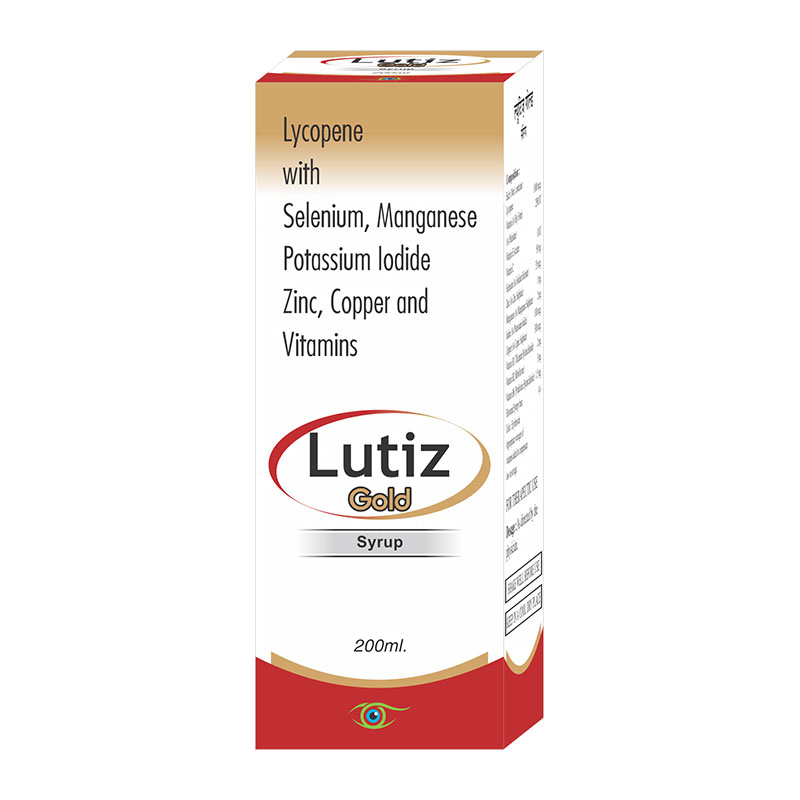Lutiz Gold (Syrup)
“Use vitamin and minerals regularly to get the most benefit from it.”
Composition:
Vitamin C (Ascorbic Acid) 50 mg, Manganese (As Manganese Sulphate) 2 mg, Vitamin B6 (Pyridoxine hydrochloride) 1.5 mg, Vitamin B2 (Riboflavin) 3 mg, Vitamin B1 (Thiamine Hydrochloride) 2 mg, Zinc (As Zinc Sulphate) 3 mg, Lycopene 10% 1000 µg, Copper (As Cupric Sulphate) 500 µg, Iodine (Potassium Iodide) 100 µg, Selenium (As Sodium Selenite) 35 µg, Vitamin A (Palmitate) 2500 IU/600µg, Vitamin E 10 IU/7mg
Vitamin C - Ascorbic acid (VITAMIN-C) is well known for its antioxidant activity, acting as a reducing agent to reverse oxidation in liquids. When there are more free radicals (reactive oxygen species, ROS) in the human body than antioxidants, the condition is called oxidative stress and has an impact on cardiovascular disease, hypertension, chronic inflammatory diseases, and diabetes as well as on critically ill patients and individuals with severe burns
Manganese- Manganese is used for prevention and treatment of manganese deficiency, a condition in which the body doesn’t have enough manganese. It can help in maintaining healthy bones as it a cofactor in several enzyme systems that promote bone formation. It can help in absorption of calcium. The functioning of thyroid is dependent on manganese along with iodine, and lack of this mineral can cause hypothyroidism. It can help regulate blood- sugar levels as it helps in the conversion of fat and protein into energy.
Vitamin B6- Vitamin B6 assists in the balancing of sodium and potassium as well as promoting red blood cell production. It is linked to cardiovascular health by decreasing the formation of homocysteine. Pyridoxine may help balance hormonal changes in women and aid the immune system.
Vitamin B2- Riboflavin deficiency is always accompanied by deficiency of other vitamins. A deficiency of riboflavin can be primary - poor vitamin sources in one's daily diet - or secondary, which may be a result of conditions that affect absorption in the intestine, the body not being able to use the vitamin, or an increase in the excretion of the vitamin from the body.
Vitamin B1- Most people who eat a normal diet do not need extra vitamin B1. However, some conditions (such as alcoholism, cirrhosis, stomach/intestinal problems) can cause low levels of vitamin B1. Vitamin B1 plays an important role in the body. It is needed to maintain the health of the nerves and the heart. Low levels of vitamin B1 may cause heart failure and mental/nerve problems. Thiamine is made available to the body as hydrochloride salt of Thiamine. Optic neuropathy can also occur in thiamine deficiency and is characterized by bilateral visual loss and impaired color perception.
Zinc- Zinc is an essential trace element and has a number of roles and functions in the human body. It is an essential component/cofactor for more than 300 enzymes involved in the synthesis and metabolism of carbohydrates, lipids, proteins, nucleic acids and other micro-nutrients. It stabilizes cellular components and membranes and so is important for cell and organ structure and integrity. It is essential for cell division and is needed for normal growth and development during pregnancy, childhood and adolescence. It is involved in DNA synthesis and the process of genetic expression.
Lycopene- Lycopene functions as an anti-oxidant that prevents free radicals from disrupting the balance of new bone formation with the bone loss that naturally occurs with age. When that balance is disturbed, bone loss exceeds bone formation, resulting in brittle bone disease osteoporosis. It reduces sun damage by 35%. Studies have shown that Lycopene is a phyto-nutrient that neutralizes harmful free radicals created by sun’s UV A and UV B rays.
Copper (Cupric Sulfate) - Copper is used for treating copper deficiency and theanemiait may cause. Having too little copper (copper deficiency) is rare. It sometimes occurs in people who get too much zinc fromdietorsupplements, have intestinal bypass surgery, or are fed by feeding tubes. Malnourished infants can also have copper deficiency.
Iodine (potassium Iodide) - Potassium iodide is used to loosen and break up mucus in the airways. This helps you cough up the mucus so you can breathe more easily if you have long-term lung problems (e.g., asthma, chronic bronchitis, emphysema). This medication is known as an expectorant. Potassium iodide is a dietary supplement. It works by supplying additional iodine to the body.
Selenium (As Sodium Selenite) - Selenium, which is nutritionally essential for humans, is a constituent of more than two dozen selenoproteins that play critical roles in reproduction, thyroid hormone metabolism, DNA synthesis, and protection from oxidative damage and infection. Selenium is crucial to our health and selenium deficiency has been linked to several health issues such as heart disease, hyperthyroidism, and a weakened immune system
Vitamin A- It is important for growth and development, for the maintenance of the immune system and good vision. Vitamin A is needed by the retina of the eye in the form of retinal, which combines with protein opsin to form rhodopsin, the light-absorbing molecule necessary for both low-light and color vision. Vitamin A also functions in a very different role as retinoic acid (an irreversibly oxidized form of retinol), which is an important hormone-like growth factor for epithelial and other cells.
Vitamin E- Vitamin E is an antioxidant that protects body tissue from damage caused by substances called free radicals. Free radicals can harm cells, tissues, and organs. They are believed to play a role in certain conditions related to aging. Vitamin E can act as an anticoagulant, increasing the risk of bleeding problems. In combination with certain other drugs such as aspirin, hypervitaminosis E can be life-threatening.
- Age related macular degeneration
- Cataract
- Retinitis Pigmentosa
- Night blindness
Take 2 capsules once daily or As directed by the physician
Precautions- Do not take large doses of vitamins while you use multivitamins with folic acid/iron syrup unless your doctor tells you to.
Side Effects- Tooth staining, increased urination, stomach bleeding, uneven heart rate, confusion, and muscle weakness or limp feeling.





